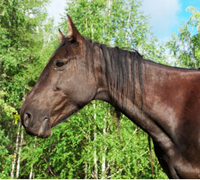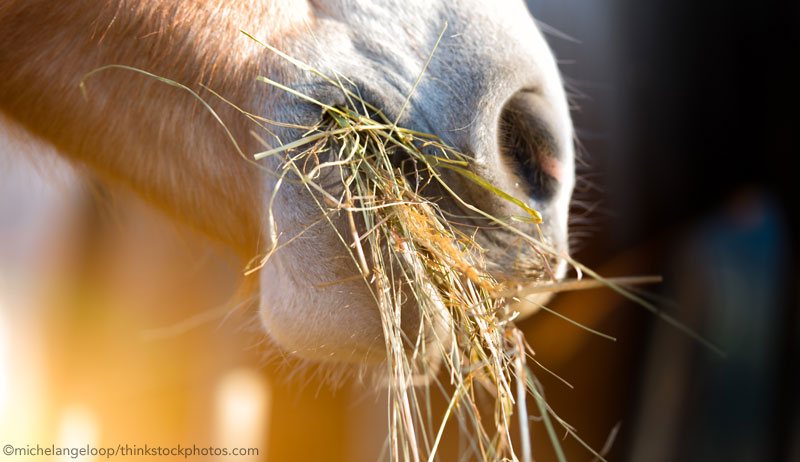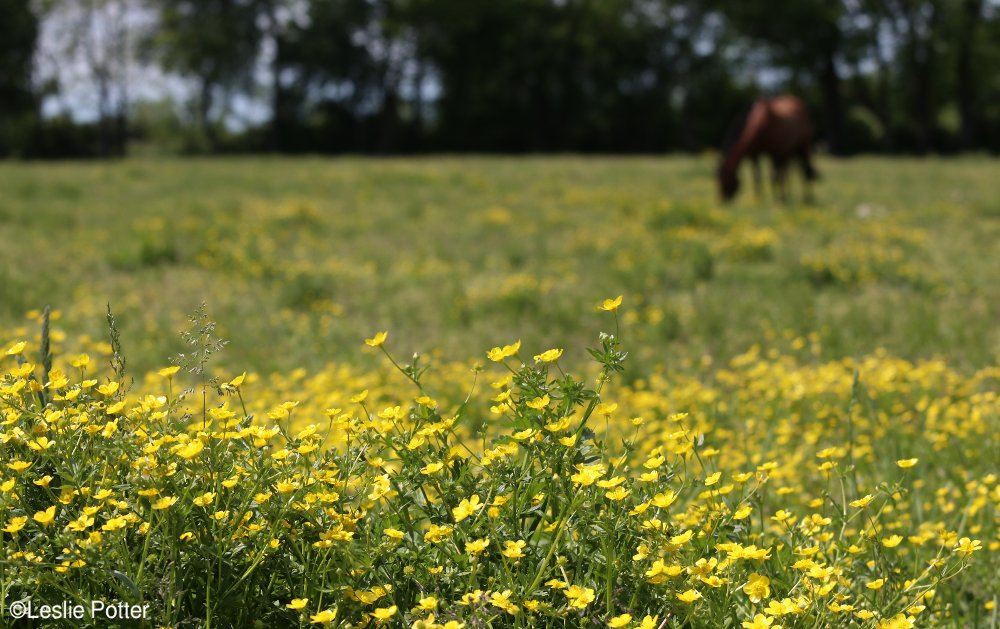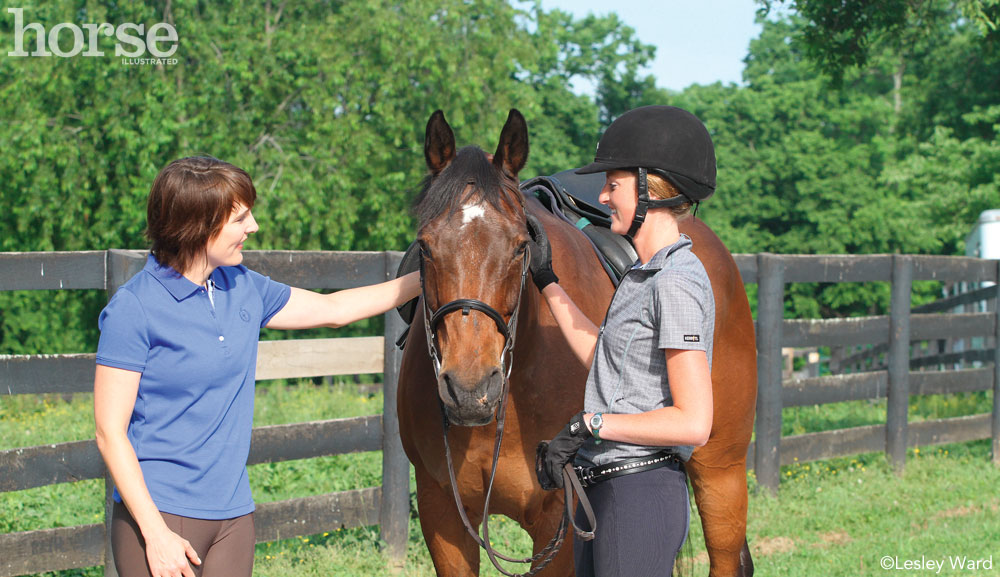 Horse for Sale: After reading the ad in the local paper, you stop by the “farm” to check out the young mare. Farm is a term used loosely—the ramshackle fences and dilapidated outbuildings are only one element to this poorly kept property. Rusted cars and equipment litter the muddy paddock where the horse stands.
Horse for Sale: After reading the ad in the local paper, you stop by the “farm” to check out the young mare. Farm is a term used loosely—the ramshackle fences and dilapidated outbuildings are only one element to this poorly kept property. Rusted cars and equipment litter the muddy paddock where the horse stands.
The mare is underweight by about 150 pounds and has a swollen knee. She slowly shuffles in your direction, then stops. You notice two feet still have shoes on them, but the hooves are overgrown by months of neglect.
The owner is an elderly widow; the horse had belonged to her husband. She knows nothing about horsekeeping and needs to find the horse a home. Any home. You have a pang of sympathy for the poor mare, and you feel the cash crinkle in your pocket.
Horses with tough pasts come in all shapes and sizes, from all backgrounds, and they experience neglect or abuse ranging from the unintentional to the truly sadistic. While it’s probably safe to say that the majority of equines are treated humanely, it’s also a fact that some are not.
So, can an abused horse be saved? What does it take to help a horse overcome his past and go on to a productive life? Are you up to the challenge? We’ll examine the answers (although they’re not always simple) to these questions and others in this two-part series.
In Part I, we’ll take a look at what abuse and neglect are and some common resulting behaviors. You’ll gain tips for meeting the short-term needs of an abused horse to set him on a path of physical wellness before any training can begin (which we’ll cover in Part II). We’ll also ask the crucial question you must answer honestly if you are considering taking on an abused horse: Do you have what it takes to help a horse with a less-than-ideal history?
What Does the Law Say?
While every state’s law is different, from a legal standpoint, horses are typically protected from such things as maiming, overwork, mutilation, torture and abandonment, which would include failure to provide basic care for more than five consecutive days.
“The majority of cases we see are related to starvation,” says Dr. Patti Klein Manke, veterinarian for the Hooved Animal Humane Society, “followed by neglect and lack of basic care.”
The Many Faces of Mistreatment
The big warmblood gelding appeared to have a perfect life, with an excellent nutrition program, top veterinary and farrier care, turnout time during the day and a warm stall at night. He was doted on by grooms and his rider seemingly liked him. But the Grand Prix dressage horse’s training was far from “classical.” The horse was ridden with draw reins attached to his double bridle; his rider cranked his head in fiercely so that he was behind the vertical during his lengthy schooling sessions. To get a more impressive piaffe, the rider used a pulley system that pulled at the horse’s legs like a puppeteer. For in the highly competitive international division, “brilliance” was being judged as much as “correctness,” and the pressure to win was enormous.
Equine mistreatment can stem from lack of knowledge as much as maliciousness or putting winning ahead of a horse’s welfare, and can result in neglect, abuse, poor handling and trauma.
Through neglect (whether intentional or not), horses may not receive the minimum amount of care they need and end up starved, battling preventable illnesses, infested with parasites or lame from lack of farrier care.
Abuse can result from intentional beating, whipping, drugging or other actions, but it also results from emotional domination, intimidation and unnecessarily heavy-handed training methods, as well as from the horse owner losing his or her temper and taking it out on the horse. It can also come from tack-related pain and lameness, whether or not intentional.
Poor handling might actually be the cause of more abuse than intentional cruelty. It’s much more prevalent and more insidious, often done in the name of tradition. Says Maureen Fredrickson-MacNamara, MSW, animal behaviorist and social worker specializing in animal-assisted therapy for clients with abuse and trauma history, “I think that horses that are very poorly handled often become unpredictable and then are labeled as abused. However, to me, a horse that has been tied to a wall and beaten often has far different behaviors than one that’s been starved with others in a barren field but received no brutal handling.”
Some horses have immense fortitude and may be able to endure what another horse would succumb to. “I think it’s similar to prisoners of war,” says Mark Rashid, a respected horse trainer and former horse abuse investigator for the State of Colorado’s Bureau of Animal Protection. “Some POWs have a high level of resilience, and they come out of the experience and get on with their lives. Others break down emotionally, and they are affected the rest of their lives. The treatment received by POWs and abused horses isn’t right, but some of them do seem to handle it and move on after the abuse stops. And some horses, in situations we might consider abusive, go to work every day without complaint.”
Behavioral Signs of Abuse
Diagnosis of abuse is difficult. Certain signs are not always absolute indicators of past negative experiences. Some horses, raised in good environments with no violence or neglect, offer the same responses as those that have been abused. They seem to be born that way.
Additionally, horses can suffer from a trauma without a human attached to the event, such as with trailer accidents. Their resulting behaviors can look similar to those related to abuse.
The Fearful Horse
“Abuse often is displayed with spookiness,” Mark Rashid says, “but mostly it’s seen as a lack of trust, which can show up in a whole bunch of different ways. These can include not wanting to be caught, acting as if they have never seen a saddle each time you bring one out, not wanting to open their mouth for the bit, shying when you pick something up and those sorts of things.”
Horses also may display their fear in ways that may be incorrectly labeled as aggressive or dominant behaviors. These may include biting, charging, kicking, rearing, striking, bucking and bolting. In these cases, the horse is essentially defending himself against future abuse. If his behaviors succeed in him being left alone by the human, so much the better.
The Shut-Down Horse
Some horses shut down emotionally in response to physical or mental abuse. “I see horses that are dull and resigned,” says Linda Tellington-Jones, trainer and creator of the TTouch and TTeam methods of working with horses. “As a result of abuse, which I believe also includes never being encouraged, appreciated or thanked, they lose their will to try and they give up.”
In Mark Rashid’s opinion, the problem with horses that have withdrawn or shut down is that, at first glance, they may seem like model citizens. “Very often, they seem somewhat lethargic, but they do everything you want and go along fine,” Mark says. “That is, right up until they don’t—and that’s when they show some pretty dramatic behavior, such as really bucking.” Mark says he has seen this behavior most commonly in horses that have been pretty badly abused physically, as well as in those that have received poor round pen training where they have been needlessly chased without reason or reward.
“Dissociation—where there’s a disconnect between consciousness and body sensation—occurs in animals as a result of trauma,” Maureen Fredrickson-MacNamara says. “It’s actually a very good survival skill. The problem is when a creature is overwhelmed with this level of fear frequently enough, the brain starts to respond to any stress by shutting down.” It can also be a detrimental response when the nervous system becomes overwhelmed, and the animal’s need to get away becomes more powerful than any physical pain he may experience in the process.
First Things First
The chestnut filly arrives at the local equine rescue barely able to walk and covered with welts and cuts over her head and body, and her eyes are swollen shut. While trying to halter train her, the previous owner got so angry that he hit her repeatedly with a 2×4.
When rehabilitating an abused horse, the physical issues must be addressed before any training can begin. Always check with your vet for the best approach.
Dr. Klein Manke advises that it’s crucial each horse be evaluated and treated individually. However, there are some general guidelines. “If a horse is starved, we start by feeding very small amounts of alfalfa hay several times each day. If they have parasites, we’ll carefully deworm them [so that the worm burden being eliminated doesn’t become impacted], and administer appropriate vaccinations.”
Like all horses, neglected and abused ones benefit from equine dentistry, farrier care, chiropractic adjustments and other health care to become comfortable again. But they will often require frequent sessions performed gently to bring them back to health. Addressing the correct fit of saddles, bridles and bits is also essential before starting any retraining.
Are You Up to the Task?
Taking a horse from a situation in which he’s beaten, starved, neglected or poorly handled and bringing him back to mental and physical health is a noble goal.
But before rescuing any horse, look at your situation realistically and examine what you can offer the horse. At this stage, don’t let your heart overrule your head. Look at the long-term ramifications of your decision, and examine whether you can help the horse.
Before making this serious commitment, take a hard look at these issues.
Neglect Versus Abuse
What type of abuse has the horse received? No rescue case should be taken on lightly. But, in general terms, it can be easier to slowly nurse a starving horse back to health than to rehabilitate a horse that has a lot of emotional issues due to abuse, poor handling or trauma.
Experience
It’s no coincidence that many rescue organizations don’t allow first-time horse owners to adopt an abused horse. Do you have the depth and breadth of experience to be able to help an emotionally damaged horse? Even some people with decades of experience decide that they can’t offer the horse the stability and consistency he needs.
Rationale
Let’s be honest. Is rescuing a horse about helping the horse, or is it because you’re making a statement about who you are? Many people do nice work with abused horses; others take them in as a badge of honor. While the horse may not be beaten any longer, and that’s good, he may not be getting the solid help he needs to move on.
Emotional Well-Being
It seems that, consciously or unconsciously, a lot of people want to take on an abused horse to repair situations that happened in their own lives. They anthropomorphize the horse, give him the same mental wounds they have, and then try to get over their pasts together.
“My concern is that you don’t become a co-victim with your horse. That is not healing for either of you,” Maureen Fredrickson-MacNamara says, who sees this in her counseling work. She adds, “If people want to do work with an abused horse to help them beyond some issues, I suggest they do so with equine-assisted therapy or a very sensitive trainer.”
“The horse doesn’t benefit from our pity,” Linda Tellington-Jones adds. “To really help them, we need to stop recalling how horrible their lives were and start living in the present so that they can move on.” Some owners, however, build an identity around the horse that remains rooted to the abuse and stuck in the past.
Facilities
While you don’t need anything fancy, you need to be able to provide the care that the horse deems most comfortable, not what you happen to have available. He may need a cozy indoor stall or 24/7 turnout, depending on what he associates with safety.
“If you board your horse, keep in mind that all the good work you’re doing with the horse may be undermined by the stable help or other boarders when you’re not around,” Linda says. “It’s hard to gain the trust of a horse that is treated inconsistently.”
Commitment for the Long Haul
Helping a horse overcome a difficult past won’t be accomplished overnight. When you commit to bringing in an abused horse, you have to do it with the knowledge that it’s a long-term project, with no shortcuts, no one-size-fits-all solutions—and no real idea of how long the horse will take to respond. Some horses might be fine in a few weeks simply because they’re living in a better place, while others may still be struggling after a few years of kind, consistent, correct work.
Taking the Next Step
If you’ve looked objectively at the situation, evaluated whether your knowledge can help the horse and have rationally decided you can commit to helping the horse for the long haul, you’re ready for the next step. It’s a giant one, but it can prove to be rewarding for both horse and human.
Next month, we’ll share tips on training and handling the abused horse to help him overcome the past and hopefully move on to a productive future. But, sadly, there are no guarantees. We’ll also look at what happens when a horse can’t be saved.
If the remaining scar is any indication, the ranch gelding’s mouth was severely cut by his bit at one time. Just how or why is anyone’s guess. He flinches and pulls back when the new buyer approaches him, but the cowboy sees the horse still has try in his eyes. And where there’s try, there’s hope.
Kara Stewart is a freelance writer and horse owner based in Colorado.
Continue on to Part 2 >>
Learn more about rehabilitating rescued horses at Horse Illustrated’s Diary of a Horse Rescue Blog >>






Good article! My heart goes out to all those poor abused horses and I wish I could adopt every one.
good article.
Nice article!! The horse I ride is a rescued Arabian, and she’s the greatest. Rescue horses are special!
Thank you for this Sight, thank you for trying to save the Horses that can’t talk. I bought a Horse last year out of pity, she was over two hundred pounds under weight- The cost for the first month ran me over $1,000 dollars. She looked a lot like this Mare- Now a year later she weighs 1200 lbs.
She is 17 years old this year.
Why oh why? Can’t people who say, they love Horses just pick up a few books on simply The care of a Horse. I have been urging so many ignorant Horse owners to simply quit having their Mares bred, foals are cute for a few months, than they are neglected And their studs fixed. I live in upper Michigan. Have had a few Horses saved with the Laws help, but now they say’ The law has changed in Michigan, and I have to look the other way- I can’t do that. There is so many Horses up here, one just down the road, the poor old guy, pure white, is just pure bones, my neighbors and I have complained and complained. No help for him. Some people do this out of greed also. Thinking that if you feel sorry for him, you will buy him out of pity!
We need more Laws on all Horses that built America. The slaughter house is not the answer. Just have your Horse fixed, and stop this from getting out of control.
Well, I’m on the way out to the barn to give my two Mares which will never have foals! A hug.
I only wish I could send you a photo of Angel- Before and after. And I am not rich at all. If I can take excellent care of my horses, so can others!
Again thank you, and if you e-mail me, I can send you photos of my Paint Angel, you won’t believe how great she looks now!
Joy Vradenburg
PS- Did I add I am on disabilty with a very fixed income. If I can still pay my bills, and take care of my Horses anyone can.
So Horse abuse in my book is simply a Crime, and one should be punished!
i think its sickening for horses to get abused. my heart aches for those horses. i dont understand how someone could hurt an innocent animal with a beautiful personality. it makes me want to save all the abused and neglected horses!
Thought your readers might be interested in this horse rescue that is doing great things!
Equine Rescue, a non-profit organization located in Bloomingburg, NY, is making a big difference in our community, but is a struggle to meet their day-to-day expenses. Since it was formed in 1996, Equine Rescue has been dedicated to rehabilitating abused and neglected horses and ponies and has helped find homes with people who have given them another chance at being useful riding horses or companions. Their web site is full of heart-warming success stories. Horses who are less adoptable have found a permanent home at the rescue. Lynda Broas, Operator of Equine Rescue, welcomes visitors to the website as well as to the facility to learn more about the program and hopefully volunteer, donate — or both. For more information, contact Lynda Broas at 845.733.6085 or visit http://www.Equine-Rescue.org.
my horse was abused when he was young he is still hard to catch in the felid but he is one of the best show horses there is
Absolutely they can be saved. I have rehabilitated several abused horses. All you need to do is rebuild their trust and respect through communication. I truly believe that any horse unless it has brain damage can be rehabilitated with the proper amount of time.
Go to http://www.battenfieldhorsemanship.com for training information.
I owned a horse that had been physcally tormented before she came to my trainer and I. We spent MONTHS working through her issues before she was able to even trust us. Eventually, she realized we weren’t there to hurt her and she had no reason to fear us. I had the strongest bond with her. My advice, if your thinking about rehabilitating, make sure you have the perfect mix of strength and pacence. Also make sure you have a skilled and supportive team behind you.
Thanks for all the information. It was very helpful. Some other thoughts…
Slow, take all the time in the world and start at the beginng. Like it has never been handled. I would give the horse/pony an least 6 month to rest and just be a horse before you do much of anything. Then just go slow, short lessons. If he/she seems nervous go back to basics and re-do something they already know.
I am trying to find the application to fill out as I am interested in possibly adopting Hope, please respond, thank you
I’m not sure which organization you are trying to reach, but we don’t offer horses for adoption…although we do feature them on our site, with a link to how to get to the organization. But we have not featured a recent horse named Hope.